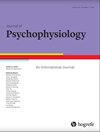Increasing Love Feelings, Marital Satisfaction, and Motivated Attention to the Spouse
IF 0.9
4区 心理学
Q4 NEUROSCIENCES
引用次数: 1
Abstract
Abstract. Love typically decreases over time, sometimes leading to divorces. We tested whether positively reappraising the spouse and/or up-regulating positive emotions unrelated to the spouse increases infatuation with and attachment to the spouse, marital satisfaction, and motivated attention to the spouse as measured by the late positive potential (LPP). Married individuals completed a regulation task in which they viewed spouse, pleasant, and neutral pictures without regulation prompt as well as spouse and pleasant pictures that were preceded by regulation prompts. Event-related potentials were recorded, and self-reported infatuation, attachment, and marital satisfaction were assessed. Viewing spouse pictures increased infatuation, attachment, and marital satisfaction compared to viewing pleasant or neutral pictures in the no regulation condition. Thinking about positive aspects of the spouse and increasing positive emotions unrelated to the spouse did not increase infatuation, attachment, and marital satisfaction any further. Motivated attention, measured by the LPP amplitude, was greatest to spouse pictures, intermediate to pleasant pictures, and minimal to neutral pictures. Although the typical up-regulation effect on the LPP amplitude was observed for pleasant pictures, positively reappraising the spouse did not increase the LPP amplitude and hence motivated attention to the spouse any further. This study indicates that looking at spouse pictures increases love and marital satisfaction, which is not due to increased positive emotions unrelated to the spouse. Looking at spouse pictures is an easy strategy that could be used to stabilize marriages in which the main problem is the decline of love feelings over time.增加爱的感觉,婚姻满意度和对配偶的动机关注
摘要爱情通常会随着时间的推移而减少,有时会导致离婚。我们测试了积极地重新评价配偶和/或上调与配偶无关的积极情绪是否会增加对配偶的迷恋和依恋、婚姻满意度和对配偶的动机关注,这是由晚期积极电位(LPP)衡量的。已婚个体完成了一个调节任务,在这个任务中,他们观看了没有调节提示的配偶、愉快的和中性的照片,以及有调节提示的配偶和愉快的照片。记录事件相关电位,评估自我报告的迷恋、依恋和婚姻满意度。与在无调节条件下观看愉快或中性的照片相比,观看配偶照片增加了迷恋、依恋和婚姻满意度。考虑配偶的积极方面,增加与配偶无关的积极情绪,并没有进一步增加迷恋、依恋和婚姻满意度。通过LPP振幅测量,动机注意对配偶图片的影响最大,对愉快图片的影响居中,对中性图片的影响最小。虽然在愉快的图片中观察到典型的LPP振幅上调效应,但积极地重新评价配偶并没有增加LPP振幅,因此没有进一步激发对配偶的注意。这项研究表明,看配偶照片会增加爱情和婚姻满意度,这不是由于与配偶无关的积极情绪的增加。看配偶的照片是一种简单的策略,可以用来稳定主要问题是爱情随着时间的推移而下降的婚姻。
本文章由计算机程序翻译,如有差异,请以英文原文为准。
求助全文
约1分钟内获得全文
求助全文
来源期刊

Journal of Psychophysiology
医学-神经科学
CiteScore
2.60
自引率
7.70%
发文量
25
审稿时长
>12 weeks
期刊介绍:
The Journal of Psychophysiology is an international periodical that presents original research in all fields employing psychophysiological measures on human subjects. Contributions are published from psychology, physiology, clinical psychology, psychiatry, neurosciences, and pharmacology. Communications on new psychophysiological methods are presented as well. Space is also allocated for letters to the editor and book reviews. Occasional special issues are devoted to important current issues in psychophysiology.
 求助内容:
求助内容: 应助结果提醒方式:
应助结果提醒方式:


